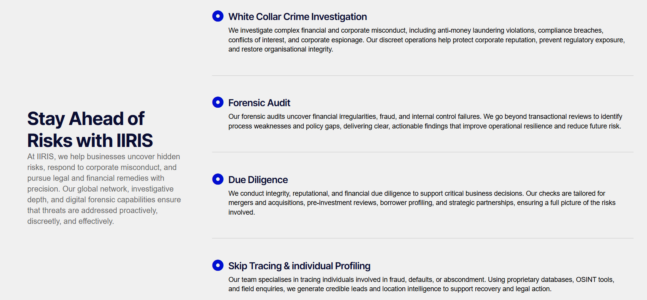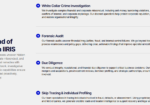In today’s complex business landscape, organizations are under constant scrutiny from regulators, stakeholders, customers, and the public. Integrity is no longer just a moral expectation—it is a business imperative. Companies that lack transparency, ethical standards, or compliance structures expose themselves to reputational damage, legal consequences, and financial loss. In this environment, corporate investigation services have emerged as a critical tool for maintaining and enhancing organizational integrity. These services go beyond merely detecting wrongdoing—they help build a culture of accountability, ensure regulatory compliance, and support transparent operations. Combined with robust incident management solutions, corporate investigations form a strong defense against internal and external threats to a company’s reputation and legal standing. Understanding Corporate Investigation Services Corporate investigation services encompass a wide range of professional investigative efforts aimed at uncovering fraud, misconduct, ethical violations, and compliance failures within a company. These services are often provided by specialized internal teams or third-party firms with expertise in legal, financial, digital forensics, and regulatory matters. Key areas covered by corporate investigations include: Financial fraud (embezzlement, bribery, kickbacks) Employee misconduct (harassment, policy violations) Regulatory compliance breaches Intellectual property theft Conflicts of interest or corruption Whistleblower complaint verification These services are designed to be both reactive—responding to reported incidents—and proactive—identifying risks before they escalate. Strengthening Integrity Through Early Detection A major role of corporate investigations is to detect unethical or illegal behavior early. Misconduct, if left unchecked, can spread throughout an organization, creating a toxic culture and serious legal liabilities. Through systematic audits, interviews, data analysis, and surveillance, investigators can identify wrongdoing at its root. For example, internal whistleblower reports—when acted upon promptly and thoroughly investigated—can prevent a small compliance issue from turning into a public scandal. Early detection through corporate investigation services also sends a message across the organization that unethical behavior will not be tolerated, thereby reinforcing integrity. Deterrence and Culture Building The very presence of a professional investigative function within a company can act as a deterrent. Employees and management are less likely to engage in questionable activities when they know their actions are subject to scrutiny. Beyond deterrence, corporate investigations play a cultural role. When employees see that misconduct is taken seriously and dealt with fairly, they are more likely to trust leadership and adhere to ethical standards. Investigations also provide valuable insights into systemic issues—such as gaps in training, poor leadership, or flawed policies—that can be corrected to improve the organization’s overall ethical framework. Supporting Regulatory Compliance Compliance with local, national, and international laws is a cornerstone of corporate integrity. Regulatory bodies expect organizations to self-police and self-report violations. Corporate investigation services enable companies to do just that. Whether it’s compliance with anti-bribery laws, data protection regulations like GDPR, or labor standards, thorough investigations ensure that companies understand the scope of any violations, take corrective action, and can demonstrate due diligence to regulators. In industries such as finance, healthcare, and manufacturing, this is especially crucial—non-compliance can lead to multimillion-dollar fines, license revocation, and irreparable brand damage. The Role of Technology: Incident Management Solutions While investigations are essential, they must be supported by strong technological systems. This is where incident management solutions come into play. Modern incident management platforms allow companies to report, track, and resolve incidents in a centralized and transparent manner. These solutions can be integrated with investigation workflows to: Log and categorize complaints or incidents Assign cases to the appropriate investigators Track investigation timelines and outcomes Maintain audit trails and documentation Generate analytics and reports for leadership and regulators By streamlining the entire process—from incident reporting to resolution—these platforms enhance the efficiency and effectiveness of corporate investigation services. Moreover, data from incident management systems can reveal patterns and trends, helping organizations identify systemic risks before they escalate. This predictive capability is a powerful way to support a proactive approach to integrity. Building Trust with Stakeholders Corporate integrity is not only about compliance—it’s also about trust. Customers, investors, and partners want to work with companies that operate ethically and transparently. When an organization can demonstrate that it has robust internal mechanisms to investigate and address misconduct, it enhances its credibility and brand value. In an era where news spreads fast and public opinion can shift overnight, having a trusted internal investigation framework is as much a public relations strategy as it is a risk management tool. Conclusion Integrity is the bedrock of sustainable business. Without it, organizations risk collapsing under the weight of scandals, lawsuits, and lost stakeholder confidence. Corporate investigation services are essential for identifying and addressing internal risks, promoting ethical behavior, and supporting compliance. When paired with modern incident management solutions, these services become even more powerful—enabling businesses to act swiftly, transparently, and decisively in the face of potential threats. By investing in these capabilities, companies don’t just protect themselves—they build stronger cultures, better relationships, and more resilient futures.

